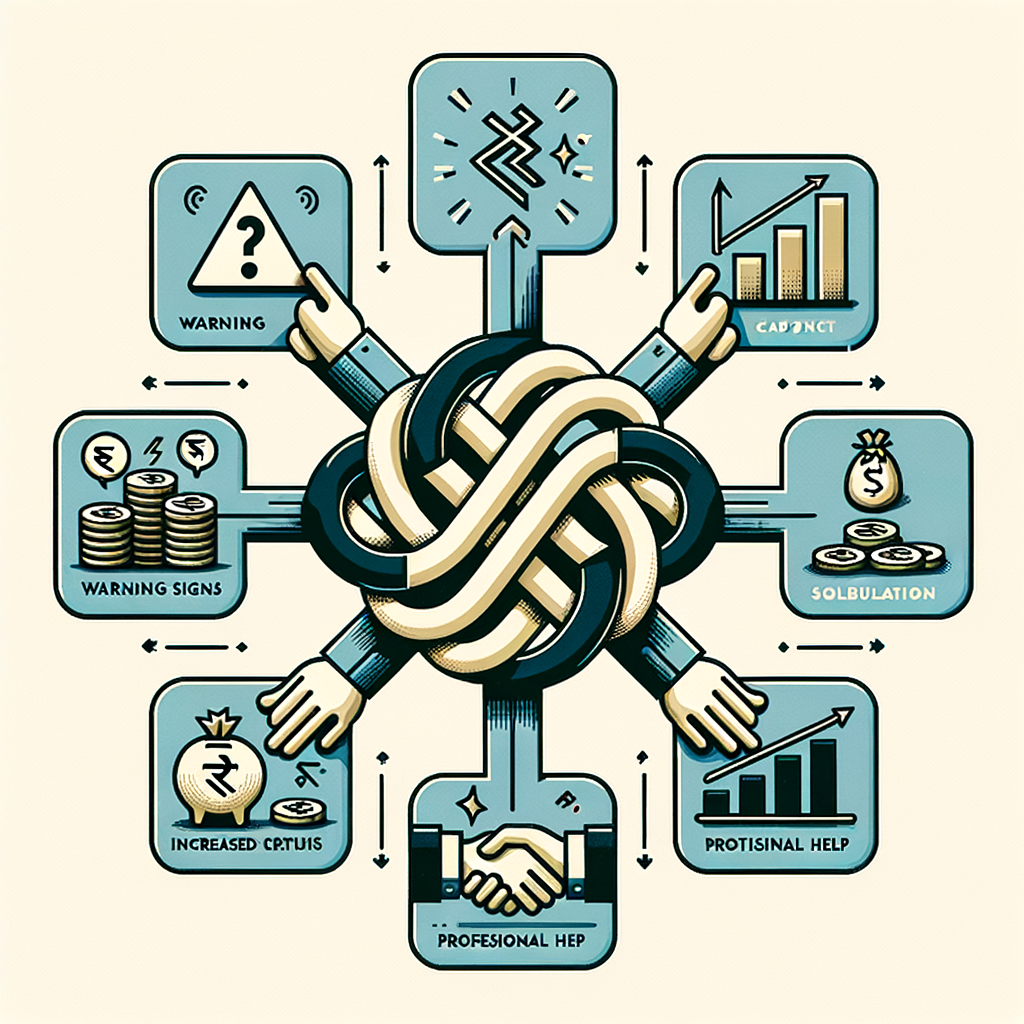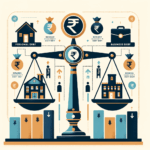When to Seek Professional Help for Your Debt Problems: A Guide for Indians
Juggling EMIs, mounting credit card bills, and business loans can feel like an overwhelming balancing act. Many hardworking small business owners and salaried individuals across India find themselves caught in a debt spiral, leading to immense stress and sleepless nights. Often, these issues stem from common pitfalls, and understanding the Top 10 Financial Mistakes Small Businesses Make is a crucial step toward financial health. While debt can be a useful financial tool for growth, unmanaged debt can quickly take control of your life, impacting your financial stability and mental well-being. This guide will outline the clear warning signs that indicate it’s time to stop struggling alone and seek professional help for debt problems. We will explore the types of help available and what you can expect from the process, especially when seeking help for debt issues India-based experts can provide.
5 Clear Signs You Need Professional Help for Your Debt Problems
Recognizing that you have a problem is the first and most courageous step towards finding a sustainable solution. If you find yourself experiencing any of the following signs, it may be the right time to consider getting expert help for debt problems India has to offer, before the situation escalates further. These indicators are not just financial metrics; they are reflections of the strain that debt is placing on your overall quality of life.
1. You’re Only Paying the Minimum on Your Credit Cards
This is one of the most common and dangerous financial traps. Credit card companies calculate the “minimum amount due” to keep you as a paying customer for the longest time possible. When you only pay the minimum, the vast majority of your payment goes towards servicing the high interest, while the principal amount you owe barely reduces. This creates a cycle where you feel like you are making payments, but your debt isn’t actually disappearing.
For example, consider a credit card balance of ₹50,000 with a monthly interest rate of 3.5% (around 42% annually). If you only pay the minimum, which is typically 5% of the outstanding balance, it could take you over a decade to clear the debt, and you would end up paying multiples of the original amount in interest alone. This is a clear signal that the debt is managing you, not the other way around, and it’s a critical moment when to get help for debt problems India.
2. Your Debt-to-Income (DTI) Ratio is Consistently High
Your Debt-to-Income (DTI) ratio is a crucial indicator of your financial health. In simple terms, it measures how much of your monthly income is allocated to paying off debts. It’s a key metric that lenders use to assess your ability to take on new credit. A consistently high DTI ratio is a major red flag that you are overleveraged and financially strained.
You can calculate your DTI ratio with a simple formula:
DTI = (Total Monthly EMI Payments / Gross Monthly Income) x 100
For instance, if your gross monthly income is ₹80,000 and your total EMIs (home loan, car loan, personal loan, credit card payments) amount to ₹35,000, your DTI is 43.75%. Most financial experts and lenders in India consider a DTI ratio above 40% to be a sign of financial distress. If you calculate your DTI and find it consistently in this danger zone, it means a significant portion of your earnings is consumed by debt, leaving little for savings, investments, or even unexpected expenses.
3. You’re Using Debt to Pay for Daily Essentials or Other Debts
One of the most critical warning signs is when the line between using debt for assets and using it for survival blurs. If you find yourself swiping your credit card for groceries, utility bills, or school fees because your salary has already been exhausted by EMI payments, you are in a precarious position. This indicates a severe and unsustainable cash flow problem where your income is no longer sufficient to cover your basic living expenses.
This dangerous cycle often escalates into “robbing Peter to pay Paul.” This means taking out a new personal loan to pay off overdue credit card bills or using a cash advance from one credit card to make the minimum payment on another. This strategy does not solve the underlying issue; it merely shuffles the debt around, often at a higher interest rate, digging you into a deeper financial hole.
4. You Constantly Feel Stressed and Anxious About Money
Financial problems are never just about the numbers; they have a profound impact on your mental and emotional health. The constant pressure of looming debt can be debilitating. If you are experiencing any of the following, it’s a sign that debt is taking a significant toll on your well-being:
- Losing sleep worrying about how you will pay your bills.
- Avoiding phone calls from unknown numbers, fearing they are from collection agents.
- Feeling a sense of dread every time you check your bank account balance.
- Having frequent arguments with your spouse or family members about money.
- Feeling isolated and ashamed to talk about your financial situation.
Your mental peace is invaluable. When financial stress begins to dominate your thoughts and affect your relationships and health, it is a valid and urgent reason to seek professional guidance.
5. You Have No Emergency Savings
An emergency fund is your financial safety net. It’s a pool of savings, typically equivalent to 3-6 months of your essential living expenses, set aside for unexpected events like a medical emergency, a major home repair, or a sudden job loss. When you are buried in debt, building this fund can seem impossible, as every spare rupee is directed towards paying off creditors.
The danger of having no emergency savings is that any unforeseen expense will force you to rely on high-interest debt, such as personal loans or credit cards, to cope. This doesn’t just add to your existing debt burden; it pushes you deeper into the vicious cycle. A lack of an emergency fund means you are living on the financial edge, one unexpected event away from a full-blown crisis.
Finding Debt Solutions in India: Who Can You Turn To?
Once you’ve decided to seek help, it’s crucial to know where to go. The right professional can provide a structured path out of debt. Fortunately, there are several avenues for finding debt solutions in India. Here are the primary types of professionals offering debt management services in India.
Credit Counsellors
- Who they are: Credit counsellors are trained professionals, often working with non-profit agencies, who specialize in consumer debt. Their primary goal is to educate and assist individuals in managing their finances and repaying their debts.
- What they do: A counsellor will work with you to create a detailed budget and a formal Debt Management Plan (DMP). As part of the DMP, they can negotiate with your creditors on your behalf to potentially lower interest rates, waive late fees, or establish a more manageable repayment schedule. You then make a single, consolidated monthly payment to the counselling agency, which distributes the funds to your various creditors.
- Best for: Salaried individuals and others with significant unsecured debt, such as multiple credit cards and personal loans.
Chartered Accountants (CAs)
- Who they are: Chartered Accountants are highly qualified financial experts who can provide a comprehensive and holistic view of your financial health, encompassing personal and business finances.
- What they do: For small business owners struggling with debt, a CA is an invaluable resource. They can assist with business debt restructuring, analyse cash flow to identify savings, and implement effective tax planning strategies to free up funds for debt repayment. They provide structured and strategic debt consulting services in India, ensuring all financial decisions are compliant with the law.
- Best for: Small business owners, entrepreneurs, and individuals with complex financial situations that involve a mix of business loans, personal debt, and intricate tax considerations.
Financial Planners
- Who they are: Certified Financial Planners are professionals who help you create a long-term strategy to achieve your financial goals, from retirement planning to wealth creation.
- What they do: While not strictly debt specialists, their expertise lies in creating a comprehensive financial plan. This plan naturally incorporates effective debt repayment strategies alongside budgeting, saving, and investing. They help you see the bigger picture and ensure your debt repayment plan aligns with your long-term life goals. This holistic approach answers the critical question of How can debt management be effectively included in personal financial planning? without sacrificing future goals.
- Best for: Individuals who may not be in a full-blown debt crisis but are feeling financially stretched and want to proactively manage their liabilities and build a more secure financial future.
Insolvency Professionals (IPs)
- Who they are: IPs are licensed and regulated professionals who are authorized to oversee formal insolvency and bankruptcy proceedings under India’s Insolvency and Bankruptcy Code (IBC), 2016.
- What they do: This is a more drastic, legal route for situations where debt has become completely unmanageable and repayment is no longer a feasible option. An IP manages the legal process of liquidating assets or restructuring finances under the supervision of the National Company Law Tribunal (NCLT).
- Best for: Businesses and, in some cases, individuals who are facing complete financial collapse and require a formal, legal resolution to their debt crisis. For more information on formal proceedings, you can visit the official website of the Insolvency and Bankruptcy Board of India (IBBI).
What to Expect: The Process of Getting Professional Debt Advice in India
Making the decision to seek help can be daunting, but understanding the process can significantly reduce anxiety. A professional approach is methodical and designed to empower you. Here’s a typical journey when you seek professional debt advice in India.
Step 1: The Initial Assessment
The first meeting is all about discovery. You are not expected to have the answers; you just need to be open and honest about your situation.
- What you do: Before your consultation, gather all relevant financial documents. This includes recent bank statements, all loan agreements, credit card bills, salary slips or business income statements, and a list of your monthly expenses. The more complete the information you provide, the more accurate the assessment will be.
- What they do: The professional (be it a CA, credit counsellor, or financial planner) will conduct a deep dive into your financial life. They will analyse your income, expenses, assets, and liabilities to get a clear, 360-degree view of the scope and nature of your debt problem.
Step 2: Crafting a Customised Action Plan
After understanding your unique financial situation, the expert will move from diagnosis to prescription. There is no one-size-fits-all solution in debt management; the plan must be tailored to your specific circumstances, income level, and goals.
- Explanation: The professional will sit down with you and explain the various options available. They will outline the pros and cons of each strategy and recommend the most viable path forward.
- Possible Solutions:
- A strict and realistic budget to control spending and maximize savings.
- A formal Debt Management Plan (DMP) to consolidate payments and reduce interest.
- A debt consolidation strategy, possibly through a secured or unsecured loan.
- For businesses, a detailed plan for financial restructuring, cost-cutting, or improving revenue streams.
Step 3: Implementation and Support
A plan is only as good as its execution. A true professional will not just hand you a report and walk away; they will guide and support you through the implementation phase.
- Explanation: This is where the real work begins. Your advisor will help you put the plan into action. This might involve them communicating directly with your creditors, assisting you in setting up new automated payment structures, or providing ongoing coaching to help you stick to your budget. The ultimate goal is to equip you with the tools and habits for a long-term solution, not just a temporary fix, ensuring you can remain debt-free in the future.
Conclusion
Facing overwhelming debt can feel incredibly isolating, but it’s a battle you don’t have to fight alone. Recognizing the key signs of trouble—such as only making minimum payments, having a high DTI ratio, and experiencing constant financial stress—is the first step toward reclaiming your financial freedom. Acknowledging that you need professional help for debt problems is not a sign of failure; on the contrary, it is a proactive and powerful step that shows you are taking responsibility for your future. The landscape of debt problems professional help India offers is diverse, with qualified CAs, credit counsellors, and financial planners ready to provide the expert guidance you need.
If you are a small business owner or an individual struggling with debt, you don’t have to face it alone. The expert team at TaxRobo offers confidential financial consulting to help you find a clear path forward. Contact us today to explore your options for a debt-free future.
Frequently Asked Questions (FAQs)
1. Will getting professional help for debt hurt my CIBIL score?
Unmanaged debt with late or missed payments will severely damage your CIBIL score. For those unsure of their current standing, learning How to Track Your Credit History Using Your PAN Card Via CIBIL is essential. Seeking professional help is a step towards repairing that damage. While some structured solutions like a formal DMP might be reported to credit bureaus and have a temporary negative impact, they are part of a clear plan to resolve your debts. Successfully completing such a plan and demonstrating responsible credit behaviour thereafter will ultimately help you rebuild your financial health and improve your credit score in the long run. It’s far better than letting defaults pile up.
2. What is the difference between debt consolidation and a Debt Management Plan (DMP)?
While both aim to simplify payments, they work differently. Debt Consolidation typically involves taking out a single new loan (like a personal loan or a loan against property) to pay off multiple smaller, high-interest debts. You are then left with one larger loan to manage, ideally at a lower interest rate. A Debt Management Plan (DMP), arranged by a credit counselling agency, does not involve a new loan. Instead, you make one consolidated payment to the agency, which then distributes the funds to your various creditors, often at interest rates that the agency has negotiated to be lower on your behalf.
3. Are debt management services in India free?
This varies depending on the provider. Some non-profit credit counselling agencies, often backed by banks, may offer their services for free or for a very nominal administrative fee. However, professionals like Chartered Accountants and financial planners charge fees for their expertise, which will be based on the complexity of your case and the time involved. It is essential to ask for a clear and transparent fee structure upfront before you agree to engage any service.
4. Can I just get another loan to pay off my current debts?
This is the core idea of debt consolidation, and it can be a valid strategy if executed correctly—for instance, if you get a new loan at a significantly lower interest rate. However, doing this without addressing the root cause of the debt (e.g., overspending habits, poor business cash flow) is extremely risky. You might clear your credit cards only to run them up again, leaving you with the old debt plus a new loan. Professional debt advice in India helps you create a comprehensive and sustainable plan that addresses your financial behaviour, ensuring you don’t just shift debt from one place to another.



